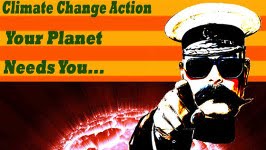| Climate Change White House Weekly Address In his weekly address President Obama talked about his efforts in creating clean energy and combating climate change. Clean Energy MORE FUEL EFFICIENCY STANDARDS ARE COMING TO A TRUCK STOP NEAR YOU! |
Sunday 14 August 2016
POTUS 2014 Hot 2015 Hotter 2016 Hotest Building on Paris Agreement
More Plastic Than Fish - project clean up ocean plastic
| "What does plastic pollution have to do with climate change? They both have their root in fossil fuels." — Anna Cummins, 5 Gyres Institute
The EPA estimates as many as five ounces of carbon dioxide are emitted for each ounce of polyethylene (PET) produced—the type of plastic most commonly used for beverage bottles. Matt Prindiville, executive director of Upstream, a sustainability venture that seeks to end plastic pollution and reduce climate disruption. He states:
"It’s a fundamental Lorax-type tale. We are wrecking the oceans—and now our food, due to microplastics attracting and bio-concentrating toxic chemicals in the marine food chain—because of our addiction to cheap, plastic products and packaging, and a comprehensive global failure to steward these materials properly. A recent study revealed that 8 million tons of plastic waste flows into our oceans each year, enough to cover every foot of coastline in the world." |
Another Org to help you convince your Uncle Denny the Denier IMPACT2C
| The Climate Service Center Germany (GERICS) was initiated by the German Federal Government in 2009 as a fundamental part of the German hightech-strategy for climate protection. Since June 2014, GERICS is a scientific organizational entity of Helmholtz-Zentrum Geesthacht – Zentrum für Material- und Küstenforschung GmbH. GERICS offers in a scientifically sound manner products, advisory services and decision-relevant information in order to support government, administration and business in their efforts to adapt to climate change. Director is meteorologist and climate scientist Prof. Dr. Daniela Jacob. The IMPACT2C project provided easily accessible climate-related information to policymakers, the media and other interested parties. The project results were put together in a series of the Policy Brief Notes. The IMPACT2C web atlas (www.atlas.impact2c.eu) was produced to provide input for the development of recommendations on possible adaptations strategies. The key messages of the IMPACT2C project can be summarized as follows:
|
Subscribe to:
Posts (Atom)
